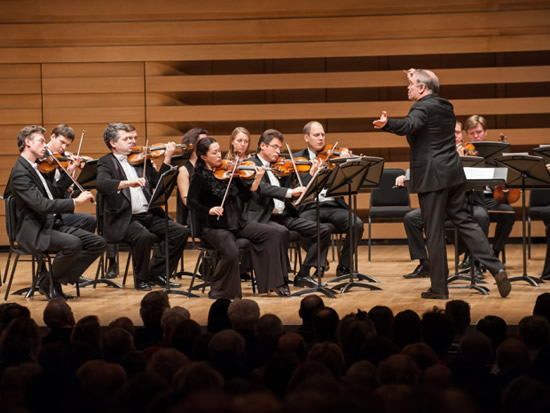
Valery Gergiev conducts the Stradivarius Ensemble
It’s black tie and dinner jacket time as the Classical Music new season begins, and in Toronto I was lucky to have tickets for the Gala performance – entitled “From Russia With Love†and featuring Valery Gergiev with the Stradivarius Ensemble. This took place in Toronto’s magnificent Royal Conservatory, which is 125 years old this year and has a brand spanking new Concert Hall.
As a Gala, I was invited to pre-performance drinks, and with Gergiev in town, vodka was definitely on the menu. That the reception lasted for 90 minutes was also somewhat brave, and Imperial Standard shots, caviar and smoked sturgeon were all consumed with some gusto. The Stradivarius Ensemble, founded by Gergiev comprises a group of musicians performing on the most famous and unique-sounding string instruments in the world, and is made up of the best musicians and leading soloists of the Mariinsky Theatre’s Symphony Orchestra. Some of the instruments are more than 400 years old. The evening concert took in some reflective yet beautiful pieces, with Richard Strauss’s Metamorphosen, a piece being a 1945 lament on the destruction of German civilization during World War II, and scored for ten violins, five violas, five cellos, and three double basses. It was composed during the closing months of the Second World War, in particular as a elegy for devastating bombing of Munich, especially places such as the Munich Opera House.
Shostovakovich followed, with his Chamber Symphony #10, also regarded by many as a war requiem, on this occasion for the destruction of Dresden. Shostakovich wrote the piece in 1960, when he was based in the city to write music for the film Five Days, Five Nights, a joint project by Soviet and East German filmmakers about Bombing of Dresden in World War II. The fact that the concert took place at the same time as the annual Red Poppy remembrances is particularly poignant and cannot have been overlooked by the Maestro. Both pieces possessed melancholia in extremis, and it is hardly a leap of faith to note that Goreki’s Symphony 3 was almost certainly inspired by these two pieces. The musicians – and the instruments – just sounded amazing. Loosening the mood up rather, the Stradivarius Ensemble then provided a more up tempo performance of Tchaikovsky’s Serenade, being based on the form of the classical sonatina, with a slow introduction. The stirring 36-bar Andante introduction is marked “sempre marcatissimo” and littered with double-stopping in the violins and violas, forming towering chordal structures. This introduction is restated at the end of the movement, and then reappears, transformed, in the coda of the fourth movement, tying the entire work together. On the second page of the score, Tchaikovsky wrote, “The larger the string orchestra, the better will the composer’s desires be fulfilled, and I am sure he would have approved of the performance given. It was exquisite. Melancholnia returned in the encore, a reading of Greig’s Holberg Suite, again beautifully played and with just the right amount of Scandinavian angst over the approach of long winter nights, which Toronto is about to embark upon itself.
Over dinner, Maestro Gergiev – whom I have met on several occasions, called for chilled vodka, even more caviar, and continued the party with special guests until late. The next morning, he didn’t make his next performance – in Ala Alto – fully on time. I shall see him next at his 60th birthday bash in London, and if in the meantime you get the opportunity to catch him, the Stradivarius Ensemble or the full Mariinsky Orchestra on their travels – do so. They are “From Russia With Love†personified.